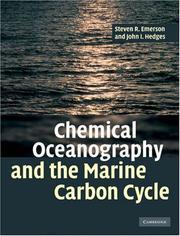| Listing 1 - 2 of 2 |
Sort by
|

ISBN: 9780521833134 0521833132 9780511793202 9780521540643 9780511649875 0511649878 9780511398551 0511398557 9780511402418 0511402414 9780511404160 0511404166 0511793200 9780511399565 052154064X 1107086000 1107174767 0511399561 0511566859 9781107086005 9781107174764 9780511566851 Year: 2008 Publisher: Cambridge : Cambridge University Press,
Abstract | Keywords | Export | Availability | Bookmark
 Loading...
Loading...Choose an application
- Reference Manager
- EndNote
- RefWorks (Direct export to RefWorks)
The principles of chemical oceanography provide insight into the processes regulating the marine carbon cycle. The text offers a background in chemical oceanography and a description of how chemical elements in seawater and ocean sediments are used as tracers of physical, biological, chemical and geological processes in the ocean. The first seven chapters present basic topics of thermodynamics, isotope systematics and carbonate chemistry, and explain the influence of life on ocean chemistry and how it has evolved in the recent (glacial-interglacial) past. This is followed by topics essential to understanding the carbon cycle, including organic geochemistry, air-sea gas exchange, diffusion and reaction kinetics, the marine and atmosphere carbon cycle and diagenesis in marine sediments. Figures are available to download from www.cambridge.org/9780521833134. Ideal as a textbook for upper-level undergraduates and graduates in oceanography, environmental chemistry, geochemistry and earth science and a valuable reference for researchers in oceanography.
Chemical oceanography --- Carbon cycle (Biogeochemistry) --- Océanographie chimique --- Océanographie chimique --- Cycle du carbone (Biogéochimie) --- Chemical oceanography. --- Global carbon cycle --- Biogeochemical cycles --- Marine chemistry --- Oceanography --- Water chemistry
Book
ISBN: 9781402083068 9781402083051 140208305X 9786611491000 1281491004 1402083068 Year: 2008 Publisher: [Berlin?] : Springer,
Abstract | Keywords | Export | Availability | Bookmark
 Loading...
Loading...Choose an application
- Reference Manager
- EndNote
- RefWorks (Direct export to RefWorks)
Microbial activities influence water-rock interaction processes and chemical transport between the major geochemical reservoirs and the formation/transformation of minerals and rocks, whereas geological processes and geochemical controls influence the microbial ecology in extreme environments. How biological activity influences geological processes and what role these processes played in the geological evolution of the Earth are fundamental questions. How do we recognize the ancient microbial activities in the rock record and what analytical methods do we use to document them to better understand the evolution of life? Can we detect the existence of microbial life in deep time by studying Archaean rocks? Microbial systems in extreme environments and in the deep biosphere may be analogous to potential life on other planetary bodies and hence may be used to investigate the possibilities of extraterrestrial life. This book explores these questions in an interdisciplinary approach, and examines the mode and nature of links between geological processes and microbial activities and their significance for the origin and evolution of life on the Earth and possibly on other planets.
Rocks. Minerals --- General ecology and biosociology --- Geochemistry --- geochemie --- ecologie --- biogeografie --- Hydrosphere --- mineralogie --- Biogeography --- oceanografie --- Geosciences. --- Biogeosciences. --- Microbial Ecology. --- Geochemistry. --- Mineralogy. --- Oceanography. --- Life sciences. --- Microbial ecology. --- Sciences de la vie --- Géochimie --- Minéralogie --- Océanographie --- Ecologie microbienne --- EPUB-LIV-FT LIVECOLO LIVTERRE SPRINGER-B --- Evolution (Biology) --- Geomicrobiology --- Geological microbiology --- Microbiological geology --- Geobiology --- Microbiology
| Listing 1 - 2 of 2 |
Sort by
|

 Search
Search Feedback
Feedback About UniCat
About UniCat  Help
Help News
News